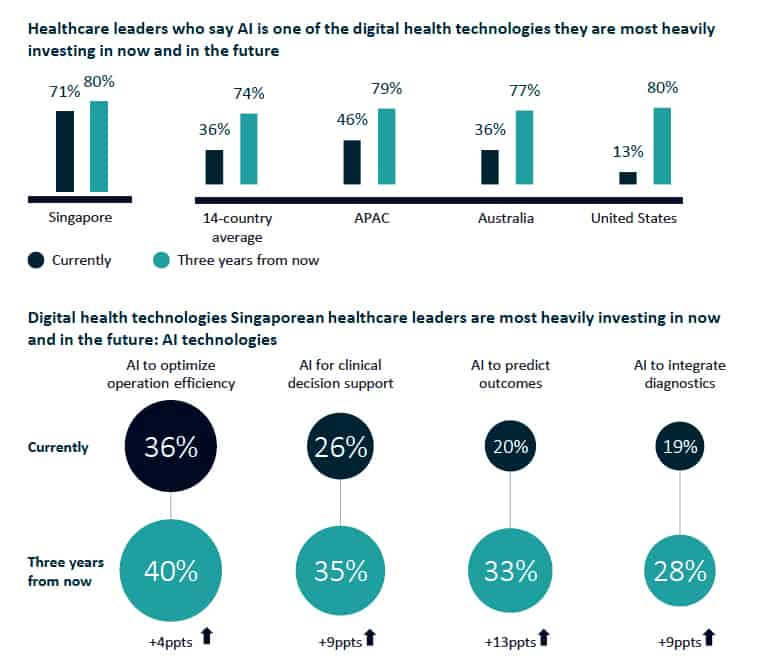The Philips’ Future Health Index (FHI) 2021 Singapore report: ‘A Resilient Future: Healthcare leaders look beyond the crisis’ Now in its sixth year, is part of a more expansive monitoring of 14 countries to analyse the current and future priorities of healthcare leaders worldwide.
The Singapore study noted that healthcare leaders are prioritizing investment in artificial intelligence (AI) and are highly ambitious about shifting care delivery to the home over the next three years. However, staff’s lack of experience with new technologies is impeding planning for more than half.
Also noted was expectation by 49% of leaders in the city to implement sustainable practices in healthcare as a primary priority of their role in three years’ time.
An optimistic outlook
Although still grappling with the pandemic, 84% of Singapore’s healthcare leaders are confident in their hospital or healthcare facility’s ability to deliver quality care in the next three years – which is higher than the confidence levels of healthcare leaders in Australia (66%), China (58%) and the average of those in the 14 countries that Philips surveyed (75%).
Also, 93% also feel that Singapore’s healthcare system has shown resilience in how it has coped with the challenges of the COVID-19 pandemic.
“The past year has undoubtedly taken a significant toll on Singapore’s healthcare system. Frontline healthcare workers have faced greater pressure than ever before, while senior leaders have been tasked with leading their institutions in the most trying of times,” said Caroline Clarke, market leader and EVP, Philips ASEAN Pacific.
The report commended Singapore for its skill in rising to the challenge.

The AI focus
The COVID-19 pandemic has accelerated radical shifts in care delivery for both patients and providers around the world and the report reveals that, as Singapore’s healthcare leaders consider what comes next, they are pragmatic about where and how care is delivered.
Healthcare leaders anticipate that, three years from now, on average 26% of routine care delivery will take place outside the walls of Singapore’s hospitals and healthcare facilities, up from around 20% today.
Singapore’s healthcare leaders are also highly ambitious about shifting care delivery to home settings.
While those surveyed said that just 19% of routine care being provided outside of the hospital is currently delivered in the home, they predict that 45% will be delivered at home three years from now – a bold target, which is far higher than any of the other countries that Philips surveyed (17% 14-country average) and the APAC average (18%).
Singapore is leading the way in championing AI, too; nearly three in four of Singapore’s healthcare leaders (71%) say that this is one of the digital health technologies that they are currently investing in – again far above the average healthcare leader across the 14 countries surveyed (36%) and in APAC (46%).
AI investment in Singapore is currently focused primarily on administrative tasks like automating documentation, scheduling appointments and improving workflow, above clinical and diagnostic applications.
However, this looks set to change in the near future, as Singapore’s healthcare leaders plan to invest in AI for clinical decision support (35%), to predict outcomes (33%) and to integrate diagnostics (28%).
Mind the skills gap
Despite these bold ambitions, staff inexperience and staff shortages could impede progress if not urgently addressed.
Philips’ research found that staff’s lack of experience with new technologies ranks among the top internal barriers to future planning in Singapore, with around half of Singapore’s healthcare leaders (52%) citing it as a current impediment, whilst one in four (25%) say that staff shortages are also holding them back.
Lack of training is also cited as the biggest barrier to the wider adoption of digital health technologies by nearly half of Singapore’s healthcare leaders (47%), followed closely by difficulties with data management (43%) likely relating to high volumes of data and a lack of clarity around ownership.
“The pandemic has confirmed the viability of remote care, and it is equally encouraging to see that Singapore is placing such a big focus on AI for the future. However, it is vital that the country’s hospitals and healthcare facilities invest in adequate training and address staff shortages to move beyond purely administrative applications of these game-changing technologies and unlock their full potential,” added Clarke.
Sustainability ambitions
The report also finds that implementing environmental sustainability practices is set to become a dominant trend in Singapore, and globally, within the next three years.
While not a current concern for many, 49% of Singapore’s healthcare leaders expect to prioritize the implementation of sustainability practices in their hospital or healthcare facility three years from now, up from just 2% today, and in line with the trend seen across healthcare leaders in the 14 countries surveyed (58% three years from now, up from 4% today globally).




